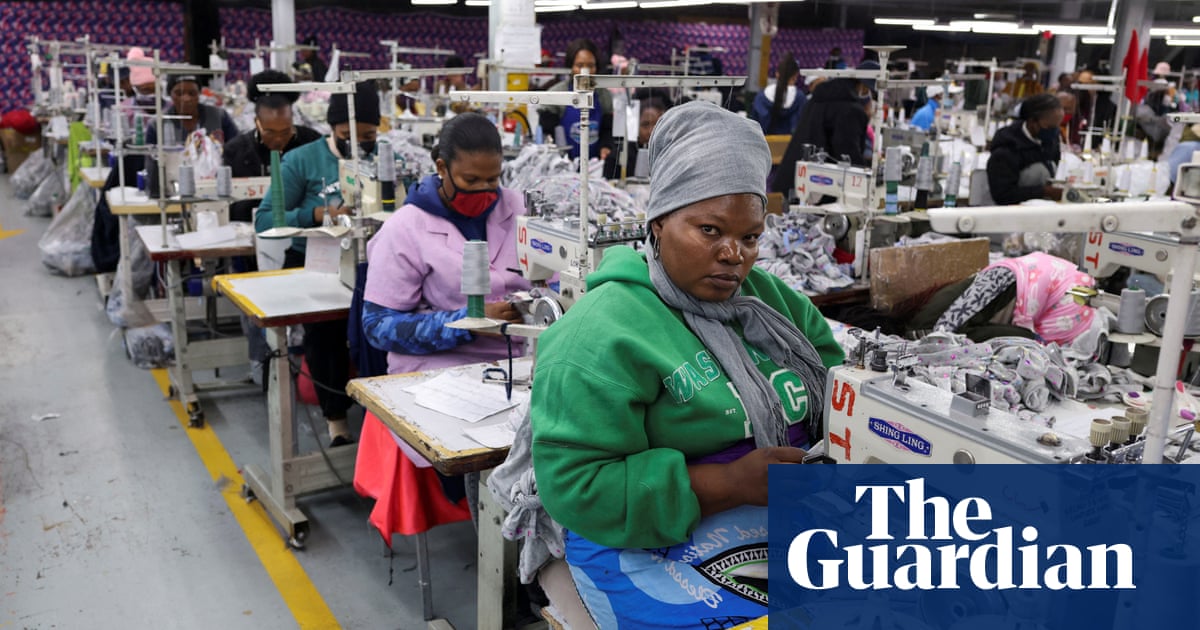The day afterDonald Trumpannounced sweeping global tariffs, Lesotho’s garment workers feared for their jobs.
Last year,Lesothosent about 20% of its $1.1bn (£845m) of exports to the US, most of it clothingunder a continent-wide trade agreement meant to help African countries’ development via tariff-free exports, as well as diamonds.
Now, all that is at risk, after the US president imposed a 50% tariff on the impoverished landlocked country, which he claimed last month“nobody had ever heard of”.
Makhotso Moeti moved to Lesotho’s capital, Maseru, from the rural centre of the tiny mountainous kingdom entirely surrounded by SouthAfrica. “Factory work is the only job I’ve known for many years,” said Moeti, who attaches labels to Gap clothing.“If the factories shut down, I won’t have many options left. I’ll be forced to return home to the very poverty I thought I had escaped when I moved to the city.”
On Wednesday, Trump unveiled what he claimed were “reciprocal” tariffs, overturning decades of global trade policy.
The tariff rates, which are due to come into force on 9 April,range from 10% to 50%and were calculated with whateconomists labelled an “idiotic” formula, penalising countries that have the highest trade surpluses with the US relative to their imports from the US.
Dr Ratjomose Machema, a lecturer in economics at the National University of Lesotho, said: “I don’t understand how this is a reciprocal tariff because we really don’t charge that much in tariffs.”
Lesotho, which has a population of 2.3 million, was hit with the highest rate. In Africa, it was followed by Madagascar, a vanilla exporter, with a tariff of 47%; Botswana, a diamond producer, on 37%; oil-rich Angola with 32%; and the continent’s most industrialised economy, South Africa, on 30%.
Like thehard-hit, south-east Asian economies, the poor majority in these countries cannot afford expensive American products. In recent decades, China has overtaken western countries to become the largest trading partner of most African countries.
According tothe African Growth and Opportunities Act (Agoa) US data portal, Lesotho exported $237m of goods last year to the US and imported $2.8m. Agoa, which has allowed tariff-free access to the US market for thousands of product types since 2000, created a thriving garment industry, accounting forabout 20% of GDP.
There are about30,000 garment workersin Lesotho, mostly women, with 12,000 making clothes for US brands including Levi’s, Calvin Klein and Walmart in Chinese- and Taiwanese-owned factories. While most of the jobs pay the monthly minimum wage of $146-$163, they are still highly sought after in the poor, largely informal economy.
In Madagascar, which has a population of about 32 million, Agoa has also nurtured a significant garment sector, which employsabout 180,000 peoplein a country where GDP per head is just $575. In 2024, the island nationexported $733m of goods to the US, with clothing the top export, followed by vanilla.
Sign up toFirst Thing
Our US morning briefing breaks down the key stories of the day, telling you what’s happening and why it matters
after newsletter promotion
Ketakandriana Rafitoson, a political science researcher at the Catholic University of Madagascar, said: “The textile and apparel sector is really a cornerstone of Madagascar’s economy … [Tariffs] will have a drastic effect on the country.”
The future of Agoa, which will expire in September if it is not renewed by the US Congress, was looking precarious even before Trump’s announcement.
Lesotho’s trade minister, Mokhethi Shelile, said officials, who had been preparing to travel to the US to ask for an Agoa extension, would argue that the tariff calculations did not include digital services from US companies such as Android and Microsoft.
He added: “That being said, we recognise that we cannot rely solely on the American market.”
Afact sheetpublished by the White House to accompany Trump’s tariff announcement said: “Today’s action simply asks other countries to treat us like we treat them. It’s the golden rule for our golden age.”
In Lesotho, Nthabiseng Khalele, a garment worker sheltering from the rain after a long day in the factory, said: “My hope and wish is that our prime minister could somehow reach out to President Trump and ask him to at least show some compassion for Lesotho. If we lose our jobs here, I’m almost certain that many of us will end up sleeping on empty stomachs.”
